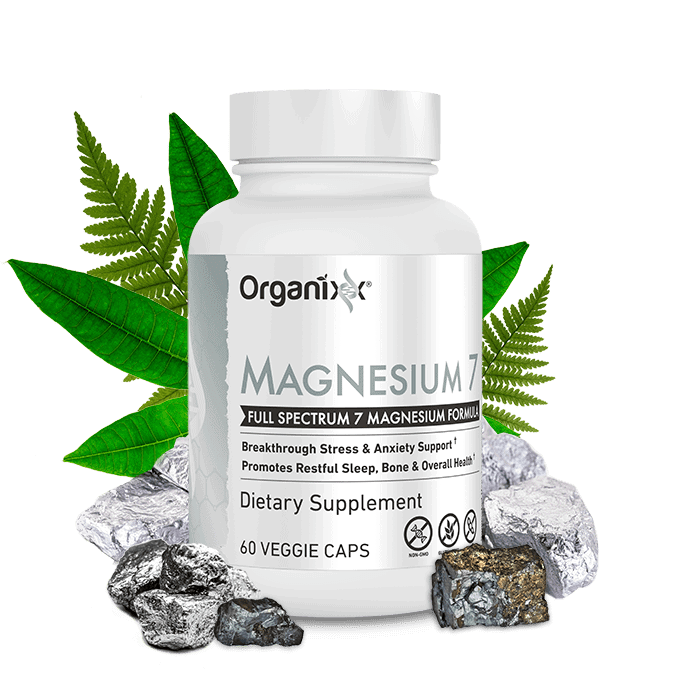Empowering you Organically – Season 14 – Episode 126
Title: Is Magnesium Your Health MVP?
Hosts: Jonathan Hunsaker, TeriAnn Trevenen
Description: Antioxidants may get all the headlines, but magnesium may just be your health MVP. Learn more about the benefits of this mineral.
* * *
Featured Product
Did you know that Magnesium is the fourth most abundant mineral in the human body?
According to the National Institute of Health…
- Magnesium is a nutrient that the body needs to stay healthy.
- Magnesium is important for many processes in the body, including regulating muscle and nerve function, blood sugar levels, and blood pressure and making protein, bone, and DNA.
Let’s dive a bit deeper into just how important Magnesium is to our health…
- It acts as a cofactor for more than 300 enzymes, regulating a number of fundamental functions such as muscle contraction, neuromuscular conduction, glycemic control, myocardial contraction, and blood pressure.
- Magnesium also plays a vital role in energy production, active transmembrane transport for other ions (ATP), synthesis of nuclear materials, and bone development.
- Important to note – magnesium deficiency has been associated with a wide range of diseases.
Magnesium and Nutrition
- According to the United States Food and Nutrition Board, recommended daily allowance for magnesium is 420 mg for adult males and 320 mg for adult females, respectively.
- Approximately 10% of the daily magnesium requirement is derived from water.
- Green vegetables, nuts, seeds, and unprocessed cereals are rich sources of magnesium. Also, some magnesium is available in fruits, fish, meat, and milk products.
- The majority of the population in the Western countries consume less than the recommended amount of magnesium, contributed by the consumption of processed foods, demineralized water, and agricultural practices using soil deficient in magnesium for growing food.
- Many studies have demonstrated beneficial effects of magnesium supplementation.
Chronic Diseases Associated with Magnesium Deficiency
- type 2 diabetes & metabolic syndrome
- Studies suggest that about 48% of people with type 2 diabetes have low levels of magnesium in their blood. This can impair insulin’s ability to keep blood sugar levels under control
- One study which followed more than 4,000 people for 20 years found that those with the highest magnesium intake were 47% less likely to develop diabetes.
- hypertension
- Magnesium helps lower blood pressure in people with elevated levels but does not seem to have the same effect in those with normal levels.
- cardiovascular disease (e.g., stroke, atherosclerotic vascular disease, sudden cardiac death)
- osteoporosis
- migraine headache
- asthma
- colon cancer
- Alzheimer’s disease
- attention deficit hyperactivity disorder (ADHD)
Other Areas of Health Where Magnesium Helps
May boost exercise performance
- Magnesium helps move blood sugar into your muscles and dispose of lactate, which can build up during exercise and cause fatigue
- Studies have shown that supplementing with it can boost exercise performance for athletes, the elderly and people with chronic disease
- In a study, athletes who supplemented with magnesium for four weeks had faster running, cycling and swimming times during a triathlon. They also experienced reductions in insulin and stress hormone levels
- Magnesium supplements have been shown to enhance exercise performance in several studies, but research results are mixed.
Magnesium Fights Depression
- Magnesium plays a critical role in brain function and mood, and low levels are linked to an increased risk of depression
- One analysis in over 8,800 people found that people under the age of 65 with the lowest magnesium intake had a 22% greater risk of depression.
- Some experts believe the low magnesium content of modern food may cause many cases of depression and mental illness; however, others emphasize the need for more research in this area.
- Nonetheless, supplementing with this mineral may help reduce symptoms of depression — and in some cases, the results can be dramatic.
- In a randomized controlled trial in depressed older adults, 450 mg of magnesium daily improved mood as effectively as an antidepressant drug.
Anti-Inflammatory Benefits
- Low magnesium intake is linked to chronic inflammation (elevated C-reactive protein), which is one of the drivers of aging, obesity and chronic disease.
- Magnesium supplements can reduce CRP and other markers of inflammation in older adults, overweight people and those with prediabetes.
- In the same way, high-magnesium foods — such as fatty fish and dark chocolate — can reduce inflammation.
Magnesium Improves PMS Symptoms
- Premenstrual syndrome (PMS) is one of the most common disorders among women of childbearing age.
- Its symptoms include water retention, abdominal cramps, tiredness and irritability.
- Interestingly, magnesium has been shown to improve mood, reduce water retention and other symptoms in women with PMS
Magnesium Is Safe and Widely Available
Magnesium is absolutely essential for good health. The recommended daily intake is 400–420 mg per day for men and 310–320 mg per day for women.
You can get it from both food and supplements.
Food Sources
The following foods are good to excellent sources of magnesium:
Pumpkin seeds: 46% of the RDI in a quarter cup (16 grams)
Spinach, boiled: 39% of the RDI in a cup (180 grams)
Swiss chard, boiled: 38% of the RDI in a cup (175 grams)
Dark chocolate (70–85% cocoa): 33% of the RDI in 3.5 ounces (100 grams)
Black beans: 30% of the RDI in a cup (172 grams)
Quinoa, cooked: 33% of the RDI the in a cup (185 grams)
Halibut: 27% of the RDI in 3.5 ounces (100 grams)
Almonds: 25% of the RDI in a quarter cup (24 grams)
Cashews: 25% of the RDI in a quarter cup (30 grams)
Mackerel: 19% of the RDI in 3.5 ounces (100 grams)
Avocado: 15% of the RDI in one medium avocado (200 grams)
Salmon: 9% of the RDI in 3.5 ounces (100 grams)
Supplements
If you have a medical condition, check with your doctor before taking magnesium supplements.
Though these are generally well-tolerated, they may not be safe for people who take certain diuretics, heart medications or antibiotics.
Organixx’s Magnesium 7:
MAGNESIUM CHELATE
This form of magnesium is especially important for muscle building, recovery, and health. [17]
MAGNESIUM CITRATE
Helps with the effects of obesity. In fact, one study found that this form helped arterial stiffness in healthy overweight individuals.
MAGNESIUM BISGLYCINATE
Often used to treat symptoms of excess stomach acid, such as stomach upset, heartburn, and acid indigestion.
MAGNESIUM MALATE
Some believe this to be the most bioavailable form of magnesium. It’s found naturally in fruits, giving them a “tart taste.”
Magnesium Malate can help with migraines, chronic pain, and depression.
MAGNESIUM ASPARTATE
This form helps the connection between your brain and muscles, your cardiac rhythms, and the overall acid-alkaline balance in your body. It also can support an elevated mood.
It is absolutely essential in the metabolism of macronutrients, as well as the utilization of other minerals, B-complex vitamins, vitamin C and vitamin E.
MAGNESIUM TAURATE
This is the form of magnesium best for your heart.
One study noted: “The complex magnesium taurate may thus have considerable potential as a vascular-protective nutritional supplement.”
MAGNESIUM OROTATE
While also helpful for the heart, magnesium orotate is believed to be the best form for metabolic improvements.
This makes it a favorite for athletes seeking enhanced recovery, energy and performance.
* * *
Subscribe to Empowering You Organically
Never miss an episode!
APPLE PODCASTS SPOTIFY GOOGLE PODCASTS





